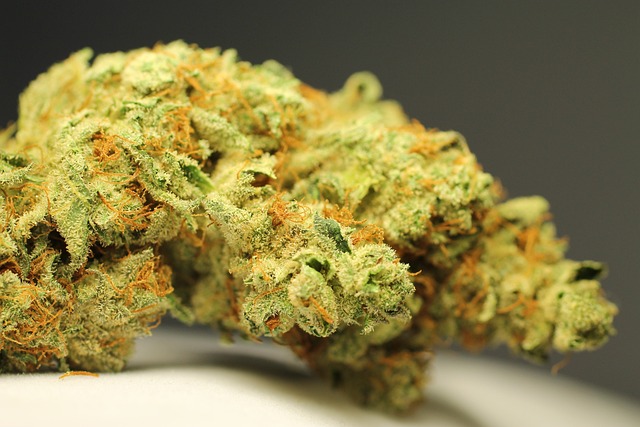The THCA flower, a non-psychoactive component of cannabis, is gaining attention for its promising anti-inflammatory properties. Unlike THC, it does not alter mental states, making it suitable for therapeutic use. Studies indicate that THCA interacts with the endocannabinoid system's CB1 and CB2 receptors to potentially manage inflammatory conditions such as arthritis and autoimmune diseases by inhibiting pro-inflammatory cytokines like COX-2 and lipooxygenase. The cultivation process is critical in preserving THCA's efficacy, requiring careful timing of harvest, controlled drying and curing conditions, and stable storage to prevent degradation into THC. Research is ongoing to define the optimal dosage and administration methods for THCA flower, with a focus on its therapeutic benefits and potential synergistic effects with other cannabinoids. The exploration of THCA flower's anti-inflammatory effects is set to contribute significantly to the field of complementary and alternative medicine, with future clinical trials expected to clarify its bioavailability, pharmacokinetics, long-term effects, and safety profile.
Exploring the transformative properties of THCA flower, this article delves into its potential as a natural anti-inflammatory agent. Uncover the science behind its therapeutic benefits, learn best practices for harvesting and handling to maximize its effects, and discover how to integrate it into your wellness routine for targeted inflammation relief. Furthermore, we’ll examine the frontiers of research that promise to expand our understanding of THCA flower’s anti-inflammatory effects, making it a subject of significant interest in both holistic health and scientific communities. Join us as we shed light on the multifaceted benefits of this cannabinoid-rich plant compound.
- Unveiling the Potential of THCA Flower: A Natural Anti-Inflammatory Agent
- The Science Behind THCA Flower's Anti-Inflammatory Properties
- Harvesting and Handling THCA Flower for Optimal Anti-Inflammatory Benefits
- Incorporating THCA Flower into Your Wellness Routine for Inflammation Relief
- Exploring the Therapeutic Frontiers: Future Research on THCA Flower's Anti-Inflammatory Effects
Unveiling the Potential of THCA Flower: A Natural Anti-Inflammatory Agent
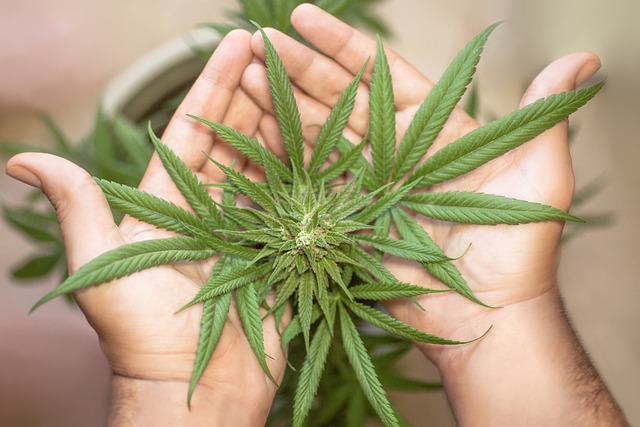
THCA flower, or tetrahydrocannabinolic acid flower, is a natural compound found in the cannabis plant that has garnered attention for its potential anti-inflammatory effects. Unlike its more famous counterpart THC (tetrahydrocannabinol), THCA is non-psychoactive, making it an attractive option for those seeking the therapeutic benefits of cannabinoids without the psychoactive “high.” Emerging research suggests that THCA possesses a robust profile of anti-inflammatory properties. These effects are believed to stem from its interaction with the body’s endocannabinoid system, which plays a crucial role in regulating various physiological processes, including pain, immune response, and inflammation. Preclinical studies have demonstrated that THCA can inhibit certain pro-inflammatory cytokines and enzymes, offering promise for its use in managing conditions characterized by inflammation, such as arthritis and various autoimmune diseases. The anti-inflammatory potential of THCA flower is an area of active research, with ongoing studies aiming to elucidate the mechanisms behind its effects and to establish safe and effective dosages for therapeutic use. As interest in cannabinoids continues to expand, the exploration of THCA’s anti-inflammatory properties represents a significant avenue for potential healthcare advancements.
The Science Behind THCA Flower's Anti-Inflammatory Properties
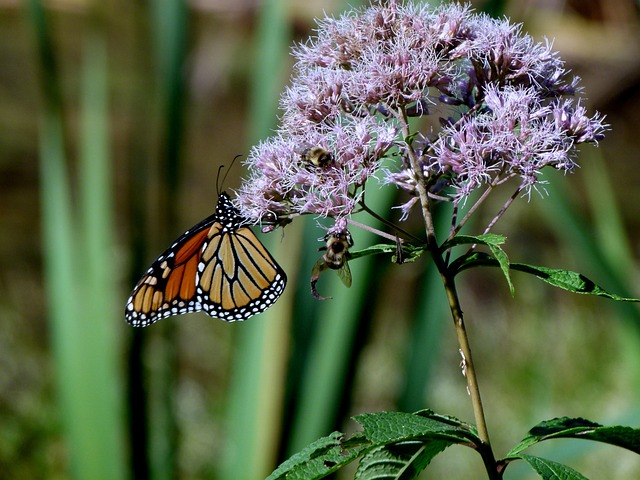
Delta-9-tetrahydrocannabinol (THC) and cannabidiol (CBD) are well-known compounds within the cannabis plant, but it’s the lesser-known tetrahydrocannabinolic acid (THCA) that has recently garnered attention for its potential anti-inflammatory effects. THCA is the non-psychoactive precursor to THC and is found in abundance within raw cannabis flowers. Scientific research indicates that THCA may exert its anti-inflammatory actions through several mechanisms. It interacts with the body’s endocannabinoid system via the CB1 and CB2 receptors, which play a role in regulating inflammation and pain. Studies have shown that THCA can inhibit certain pro-inflammatory cytokines and enzymes, such as COX-2 and lipooxygenase, without the psychoactive effects associated with its decarboxylated form, THC. This makes THCA an appealing compound for those seeking anti-inflammatory benefits. Furthermore, research suggests that THCA may have a role in modulating the immune response, offering potential therapeutic applications for conditions characterized by excessive inflammation, such as arthritis and other autoimmune disorders. The anti-inflammatory properties of THCA flower are a subject of growing interest, with preclinical studies providing insights into its mechanisms of action and suggesting that it may be a valuable addition to complementary and alternative medicine practices for inflammation-related conditions.
Harvesting and Handling THCA Flower for Optimal Anti-Inflammatory Benefits

harvesting THCA flower for its anti-inflammatory effects requires careful consideration throughout the process, from cultivation to storage. The therapeutic potential of THCA, or tetrahydrocannabinolic acid, an abundant cannabinoid precursor in cannabis plants, has been the subject of scientific interest due to its anti-inflammatory properties. To preserve these benefits, growers must harvest the flowers at the appropriate maturity stage. This is typically when the trichomes on the flower’s surface, which house the THCA, are cloudy rather than clear, indicating peak cannabinoid concentration.
Post-harvest handling is equally critical to maintain the anti-inflammatory effects of THCA. Immediately after harvesting, the flowers should be dried in a controlled environment with stable humidity and temperature to prevent degradation. Proper curing involves storing the dried flowers in airtight containers away from light, which helps to slowly decarboxylate the THCA into THC while preserving the plant’s other compounds. This process not only activates the psychoactive effects of THC but also ensures that the anti-inflammatory properties of THCA remain intact for therapeutic use. Additionally, handling the flowers with clean, dry tools and minimizing exposure to oxygen and heat will further protect the integrity of THCA and its beneficial effects. This meticulous approach to harvesting and handling is essential for maximizing the anti-inflammatory benefits of THCA flower.
Incorporating THCA Flower into Your Wellness Routine for Inflammation Relief
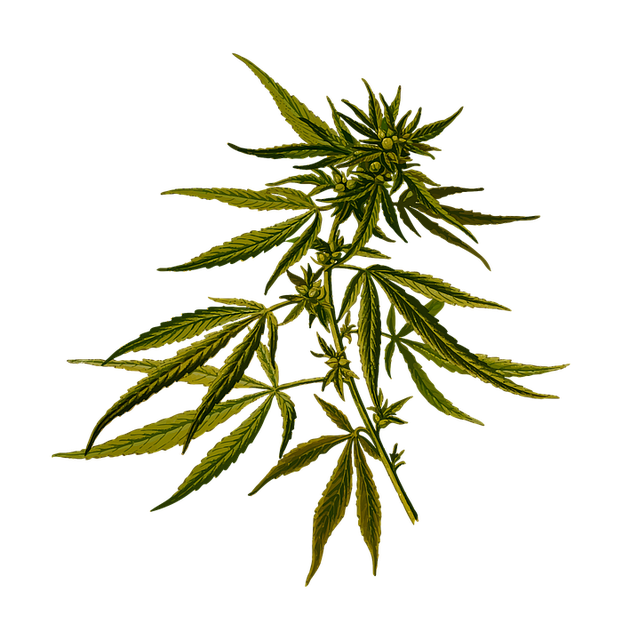
The THCA flower, which is the raw form of cannabis before it undergoes heat during the decarboxylation process to become THC, has garnered attention for its potential anti-inflammatory effects. Unlike its heated counterpart, THCA possesses a unique chemical profile that includes tetrahydrocannabinolic acid, which interacts with the body’s endocannabinoid system. This interaction may help in modulating immune responses and reducing inflammation, making it a valuable addition to wellness routines for those experiencing inflammatory conditions. Preliminary studies suggest that THCA can inhibit certain pro-inflammatory cytokines without the psychoactive effects typically associated with cannabis use. As a result, incorporating THCA flower into one’s wellness regimen could offer relief from inflammation-related discomfort without impairing cognitive functions or altering mental states, as would be the case with its psychoactive counterpart.
For individuals seeking natural alternatives to manage inflammatory pain and discomfort, THCA flower offers a promising avenue. It can be consumed in various forms, such as through smoking, vaporizing, or infusing it into edibles, allowing for flexible dosing and administration tailored to individual preferences and needs. The anti-inflammatory effects of THCA are thought to be due to its ability to bind to both CB1 and CB2 receptors in the endocannabinoid system, which plays a role in maintaining homeostasis within the body. This binding action may help alleviate pain and inflammation by reducing the activity of certain immune cells that contribute to inflammatory responses. As interest in cannabis-derived treatments continues to grow, THCA flower stands out as a potential therapeutic option for those seeking natural relief from inflammation.
Exploring the Therapeutic Frontiers: Future Research on THCA Flower's Anti-Inflammatory Effects
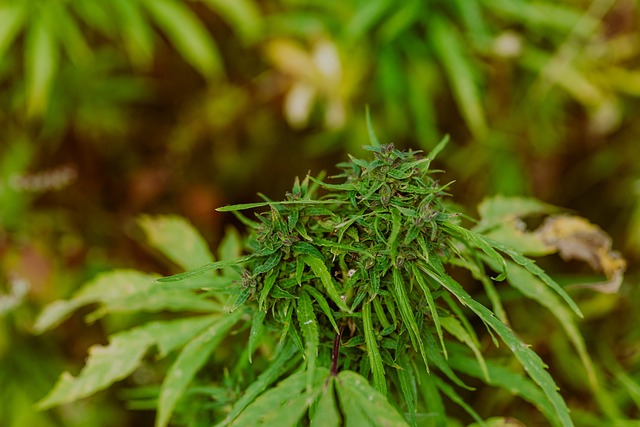
Delta-9-tetrahydrocannabinolic acid (THCA) is a non-psychoactive precursor to the well-known compound delta-9-tetrahydrocannabinol (THC), found abundantly in cannabis flowers. Recent scientific inquiries have begun to shed light on the potential anti-inflammatory effects of THCA flower, which could pave the way for innovative therapeutic applications. Studies indicate that THCA may modulate various inflammatory pathways, holding promise for treating a range of inflammatory conditions. The anti-inflammatory properties are attributed to THCA’s interaction with the body’s endocannabinoid system, specifically the CB1 and CB2 receptors, which play a critical role in regulating immune responses.
As research progresses, it is becoming increasingly clear that THCA flower could be a valuable resource in the quest to develop new anti-inflammatory agents. Future research directions are likely to explore the optimal dosages and administration methods for maximum efficacy, as well as the potential synergistic effects when combined with other cannabinoids or therapeutic compounds. Additionally, understanding the bioavailability and pharmacokinetics of THCA is crucial for elucidating its therapeutic potential. Investigations into long-term effects and safety profiles will also be imperative to ensure that the benefits of THCA flower can be harnessed responsibly in various medical contexts. The convergence of preclinical and clinical trials with advanced analytical techniques will undoubtedly expand our knowledge of how THCA flower’s anti-inflammatory effects can be effectively utilized in healthcare.
The exploration into the thca flower’s potential as a natural anti-inflammatory agent reveals promising insights into its therapeutic benefits. The scientific findings underscore the thca flower’s capacity to alleviate inflammation, making it a compelling addition to wellness routines. As future research continues to elucidate its effects, the thca flower stands out as a noteworthy subject within the realm of natural remedies and anti-inflammatory therapies. Embracing the optimal harvesting and handling methods ensures that the thca flower’s benefits are fully realized, making it a valuable option for those seeking alternatives to manage inflammation.
